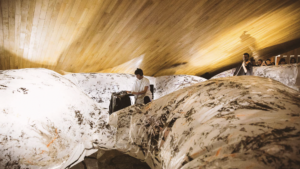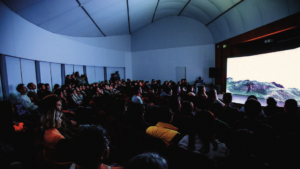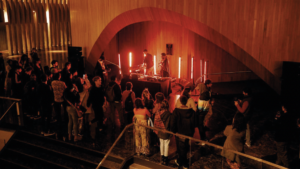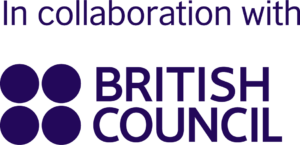- Posted on October 24th, 2024
Cultura Circular: Sustainable Arts Festivals Exchange Programme is Back

An exchange programme for Caribbean and Latin American Festivals
‘Cultura Circular’ (Circular Culture) is back with its third cohort, in partnership with British Council Americas. The programme runs from September 2024 to April 2025 supporting arts festivals across Latin America and the Caribbean across a wide variety of art-forms from film to performance to literature.
For Cultura Circular, Julie’s Bicycle and guest speakers will be sharing learnings around sustainable good practice and the festivals will also exchange knowledge between themselves in networking sessions. This year the programme has expanded again, from 38 festivals across 8 countries, to 40 festivals across 10 countries! We welcome festivals from Chile and Jamaica joining the programme this year, alongside countries already involved, Argentina, Brazil, Colombia, Cuba, Mexico, Peru, Trinidad & Tobago and Venezuela.
Similarly to previous years, this year’s programme will be delivered in two courses of online training and knowledge exchange sessions, including individual mentoring sessions with the Julie’s Bicycle team and a networking session to enable collaboration and partnership development between the festivals. A new addition to the programme this year is the creation of a podcast. This will include team members from festivals involved in the Cultura Circular programme discussing their festivals’ sustainability actions and learnings from the programme.
Working across multiple countries and such a wide variety of art forms enables us to provide great impact and support to drive real change across the sector.

Who is participating this year?
The festivals involved in the Cultura Circular programme cover a wide variety of artistic disciplines; music, cinema, animation, videography, photography, performing arts, visual arts, literature and design.
Argentina: Festival Internacional de Cine de Derechos Humanos (FICDH); Festival Arte x igual; Fiesta Federal de las Orquestas Infantiles y Juveniles de Argentina; Festival Guateque Soundz; ANIMA2024 – XIV Festival Internacional de Animación de Córdoba.
Brazil: CoMA e Latinidades; Meeting Of Favela 2024; Kino Beat; Feira Preta; Baguncinha, o Festival; Se Rasgum; Favela Sounds.
Chile: Ventana Sur 2025; Fluvial
Colombia: Petronio Power en Alianza con el Festival de Música del Pacífico “Petronio Álvarez” y El Centro 312 de La Universidad Icesi; La Movida FIAC; Festival Internacional de Cine Golfo de Morrosquillo (FICGO); Festival De Arte Urbano De Mujeres IBANASCA; Festival Afrodiáspora: la Nación del Ritmo 2024; Encuentro Internacional de Artes y culturas digitales – MASS 2025
Cuba: International Environmental Film Festival “Isla Verde”; Eyeife Woman Festival
Jamaica: Calabash 2025; GROUNDWORK; The Shotlist
México: Luciérnagas para la Paz 2025; Festival Internacional Cervantino; Muestra de Cine de la Mixteca; What Design Can Do México GNP; Festival Internacional de Cine en Guadalajara
Perú: Mi Primer Festival; 10 Años; Ipanamu: Festival de Arte (SOS)tenible; Festival Internacional De Cine De Montaña – INKAFEST; Conciencia & Soundsystem
Trinidad and Tobago: Welcome to Freetown; Siparia Cousoumeh Festival
Venezuela: Festival: ¿Qué significa ser caraqueño?; Festival Ascenso de Fotos y Videos de Aventura; Festival Círculo Escénico

What did we learn from previous iterations?
The previous two years of Cultura Circular have provided valuable support to 71 festivals across Latin America and the Caribbean. 30% of the festivals reported involvement in cultural and climate action groups before the programme and 60% of festivals reported having a dedicated team for developing and coordinating environmental action.
After completing the programme, most festivals reported that our training was ‘excellent’ for giving them knowledge and understanding to improve their confidence to act on sustainability and climate change. In particular, the festivals appreciated the opportunity to network, develop conversations, and share learnings with other organisations participating in the programme. Many have set up Whatsapp groups following the networking sessions to be able to continue these conversations outside of the programme.
Initial conversations were held from the collaboration of organisations within this programme to set up Music Declares Emergency Brazil.
Examples of action that festivals are taking:
“We were frustrated that the city’s rubbish trucks deposited the waste we had separated at source in a single container. This encouraged us to work with contractors and suppliers who compost and recycle. Now, the city council offers separate collection services, which shows that the festival was the driving force for change in the region.”
“At our festival in Brazil we’ve set up a vegan food area where they don’t use any plastic other than single-use plastic, and before that, they do an awareness campaign for people to bring their own glasses (not glass) through social media to have more direct contact with the public.”
“We’re thinking about the start and finish times of our festival so that people can use public transport more safely and consequently avoid the increase in private transport.”
Considerations were taken around differences between the available systems in each country, such as the availability of clean drinking water and recycling systems. Participants were encouraged to be aware of what was immediately possible for them to take action and also explore areas where they may have more influence, for example, with local authorities to support the development of more robust recycling systems. In some countries, Festivals use cooperatives of recyclers to collect the waste; in others, they have been at the forefront of conversations and new agreements with drink suppliers to reduce packaging and reuse cups, and in most cases this requires the support of urban infrastructure innovation with city government.
To find out more about the Cultura Circular programme in previous years, read this blog by our Creative Green Programme Lead, Graciela Melitsko Thornton, written after the last cohort completed the programme.
Finally…
We are delighted to see participants developing leadership skills and feeling empowered to upscale their projects and further develop their sustainable practice. As seen in the mentoring sessions, participants were open to exploring themes that they haven’t addressed before, such as calculating the carbon footprint, reviewing new arrangements for waste management, reducing the use of plastic and single-use materials, increasing vegetarian food offers, incorporating sustainable design from the planning stage, among others. Some festivals are already thinking of piloting ideas in their next edition. How to communicate the festival’s ambition and initiatives and engage with audiences is another crucial area many want to continue exploring.
We look forward to sharing reflections and practical examples of action from the festivals in our upcoming podcast – join our mailing list to make sure you don’t miss out.

Images from La Bienal de Música Córdoba
